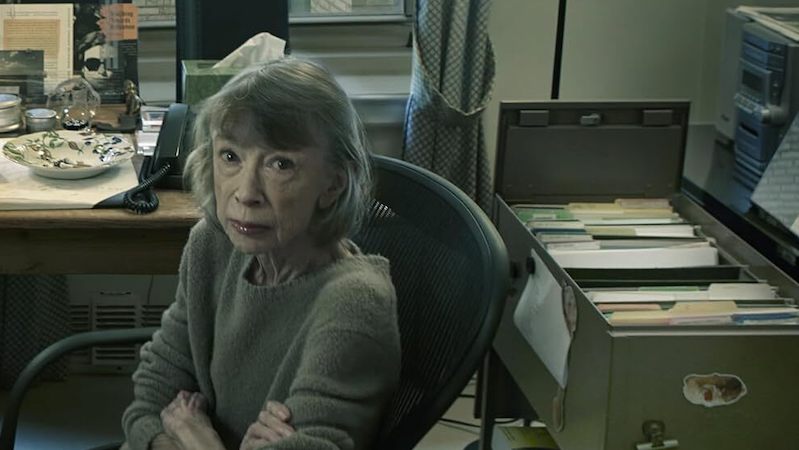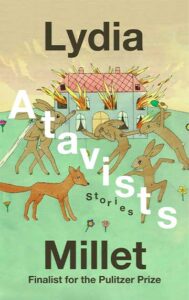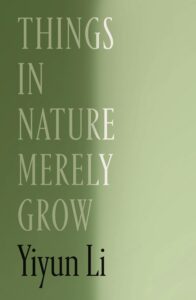
Our treasure trove of terrific reviews this week includes Molly Young on Marie-Helene Bertino’s Exit Zero, Brian Dillon on Laurent Binet’s Perspective(s), Fiona Maazel on Lydia Millet’s Atavists, Dan Piepenbring on Yiyun Li’s Things in Nature Merely Grow, and Lynn Steger Strong on Joan Didion’s Notes to John.
“Exit Zero is a death-obsessed book. Sometimes death sets a story in motion, as when a woman’s estranged father dies and she discovers a unicorn living in his yard. Sometimes death is tangential, as when a fatal car crash leaves the survivor with an unlikely souvenir—a fine art portrait of Cher—that becomes a sort of religious icon in her wrecked life. The stories are dense with funeral homes, cancer, gravestones, emergency surgeries, war. Dense, but not heavy. This is partly because Bertino is a very funny writer.
…
“These stories frolic in the nether zone between fantasy and reality. Reality: The characters exist in concrete locations (Pennsylvania, New Jersey, New York) and in an era that is recognizably our own—a present infested with streaming television, emojis, Taylor Swift and promotional emails from J. Crew. But this terra firma is also home to saints, ghosts, vampires and unnameable but palpable emissaries from other realms.
…
“Short stories submit to technical scrutiny far more readily than novels; their small scale makes the elements of craft—setups, incidents, reversals—easier to extract and examine than they are in a lengthier work. This vulnerability to dissection makes the form tricky to master and terrifying to write. But when a short story works, it can wield truly occult powers, exerting a force disproportionate to its dimensions. Through all of Exit Zero Bertino blurs the line between writer and magician.”
–Molly Young on Marie-Helene Bertino’s Exit Zero (The New York Times Book Review)
“How much of this summoning of other writings is mere paratextual pizzazz on Binet’s part, how much meant to have been interposed by B., his nineteenth-century stand-in? In a novel this saturated with self-aware wit, it’s probably both. Perspective(s) has an obvious precursor in Umberto Eco’s The Name of the Rose, in which the semiotic theorist essayed at length—the first one hundred pages, Eco said, were a test of readerly attention or boredom—a mash-up of Borges, Conan Doyle, and medieval scholasticism. Binet includes aspects of the gossipy side of Vasari’s Lives, echoes of Les liaisons dangereuses, and the inherent comedy of the novel-in-letters, where nobody is ever really being themselves on the page. But the main intertext is surely Edgar Allan Poe’s ‘The Purloined Letter,’ which invents so much of the modern detective story, including forensic analysis and plain-sight chicanery. In Perspective(s), it’s Cellini who is dispatched to find Venus and Cupid concealed in a cabinet of curiosities—and who likes foolishly to crow about his powers of subterfuge and divination.
Actually, most of the characters in this smart and funny novel think of themselves as consummate intriguers; in comedy, after all, nobody is inherently good, though they may be stupid. Still, there is a running and not wholly ironic reflection here on aesthetics and politics: a study, in its arch and antic way, of the possibility of art as such at a time of state or church censorship and the patronage, hard to resist, of rich, powerful, and capricious monsters.
…
“In some ways, Perspective(s) is more obviously an entertainment, but it’s also a reminder that metafiction, baroque allegory, erudite citation, genre pillage, and the novel of aesthetic ideas are not just the preserve of a now-distant postmodernism. As well as being enjoyably devious, they have been around for centuries, and they might offer one good hope of outflanking the blanker ironies and implacable cultural ordinances of our own time.”
–Brian Dillon on Laurent Binet’s Perspective(s) (4Columns)

“Most of these stories do not stand on their own—they aren’t meant to—which puts a lot of pressure on their cumulative power to stir in readers both the dread and joy of being alive (this being, IMO, the bar that fiction needs to clear to be great). Atavists succeeds on the dread, less so on the joy, which perhaps speaks to just how grim it feels to be a liberal in this country today. Not because we’ve lost power but because we’ve lost our way. In this collection, we liberals are mostly ridiculous, feckless, insipid and sometimes just sad.
The title of the book suggests Millet is exploring character traits that are primordial (as in essential) or anachronistic (as in ill-fitting). Both interpretations seem viable for the 14 people we meet here, each one an ‘ist’—the tourist, artist, cosmetologist, etc.—as they wrangle with first-world problems that belie a society in collapse and disarray.
…
“There is something so small and ugly about all this. Millet is really toeing the line between piercing satire and cynicism. But what’s wrong with cynicism as a coping strategy for mass extinction and ascendant tyranny?
…
“Atavists concedes ground to the disillusioned among us. I can see why—there’s so much to feel terrible about these days. And yet there’s still goodness out there, right? Not just the sort of goodness a middle-aged man deploys to mitigate his own sense of obsolescence (as does the ‘Optimist,’ who builds a tiny house on his property to take in Afghan refugees who never come), but the kind of goodness that vanquishes doom, or at least helps delay it. If nothing else, Atavists reminds me that we need to try a hell of a lot harder.”
–Fiona Maazel on Lydia Millet’s Atavists (The New York Times Book Review)

“It’s a principled and forbidding project, an edifice to reason built on a foundation of sorrow. Li in these pages appears neither guarded nor vulnerable, neither stoic nor inflamed. She describes a cerebral asperity ‘in which lucidity and opacity are one and the same,’ a ferocious empiricism that accepts the limits of what’s real. Her lack of emotion baffles the people around her, who expect, or even require, keening expressions of grief.
…
“Li chronicles many feeble efforts to acknowledge the magnitude of her suffering; parts of her book are a kind of etiquette guide. There are clumsy overtures from God-fearing types, and tactless stabs at empathy: ‘Her children are in college now, and my child is in college too. So we are in a similar situation as you are. We don’t get to see our children that often, either.’ There are friends so flummoxed that they simply say nothing, and never get around to saying anything else. Strangers cozy up to her—she teaches at Princeton, and perhaps, if they pay their respects just so, their children could enroll there. Most egregious is the woman who complains to Li that her daughter, a close friend of Vincent’s, did not receive a farewell text from him, as two others had.
Writers like to acknowledge the poverty of language, usually as we screw up the courage to try something fancy with it. Hordes of us are out there hoping to say the unsayable. Not Li. When she writes that ‘words fall short,’ she means it: the one stock phrase she likes is ‘there is no good way to say this.’ The power of Things in Nature Merely Grow resides in her refusal to pay obeisance to words.
…
“This halting, haunted recitation, almost like the conjugation of an unfamiliar verb, speaks to Li’s state more precisely than anything else in the book. ‘The abyss is my habitat,’ she writes. ‘One should not waste energy fighting one’s habitat.'”
–Dan Piepenbring on Yiyun Li’s Things in Nature Merely Grow (Harper’s)
“Despite the confessional turn, Didion’s essential approach remained consistent. Those late memoirs are works of both exposure and careful control; they withhold from the reader the undignified details of the husband’s death, the daughter’s decline, and the mother’s disorienting pain. The letters in Notes to John comprise the raw material. At the time they were written, Quintana, then in her mid-30s, struggled with alcoholism, was fired and seemed unwilling to find work, lied to her parents about her drinking, and ran through $110,000 in a single year. These notes were written by a terrified mother grasping to make sense of her grown-up, slowly disintegrating child.
…
“Although the phrasing in these letters is sometimes as precise as that in Didion’s published work, so many of her other stylistic flourishes are gone. Missing here is her tendency to pivot to other people, deeper history, and broader reading. Nor is there any sign of her compulsion to hold up a sentence for interrogation and redefinition … Notes to John is naked, unadorned. It’s Didion but ‘unprecedentedly intimate,’ just as the copy on the book jacket promises. Implicit in this promise is access to a different layer of the writer’s humanity, and by extension to our own. Yet the book evades a set of larger questions: Why do we need to see writers (or anyone) at their most open and despairing to be convinced that they are also human? How does our understanding of the line between art and exploitation shift once the writer dies and can’t make choices for herself? Why do we feel the need to lay them bare when they can no longer speak for themselves?
…
“…this book is not art, because art-making lives in the act of crystallizing the mess of life into a tighter, sharper form. It makes experiences that are separate from ours seem intimately real; it feels bigger than the material out of which it is carefully hewn. Literature emerges from exceedingly difficult acts of choice-making—cutting off and away aspects of an experience that the writer feels is extraneous to the work. In interviews, Didion compared writing to performance (she’d initially wanted to be an actor). Although there are certainly writers who think that the way to find meaning is to press into the pain, that was not ever her style.”
–Lynn Steger Strong on Joan Didion’s Notes to John (The Atlantic)

